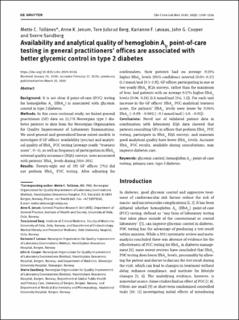Availability and analytical quality of hemoglobin A1c point-of-care testing in general practitioners’ offices are associated with better glycemic control in type 2 diabetes
Tollånes, Mette Christophersen; Jenum, Anne Karen; Berg, Tore Julsrud; Løvaas, Karianne Fjeld; Cooper, John; Sandberg, Sverre
Journal article, Peer reviewed
Published version

View/
Date
2020Metadata
Show full item recordCollections
Original version
Clinical Chemistry and Laboratory Medicine. 2020, 58 (8), 1349–1356. 10.1515/cclm-2020-0026Abstract
Background: It is not clear if point-of-care (POC) testing for hemoglobin A1c (HbA1c) is associated with glycemic control in type 2 diabetes.
Methods: In this cross-sectional study, we linked general practitioner (GP) data on 22,778 Norwegian type 2 diabetes patients to data from the Norwegian Organization for Quality Improvement of Laboratory Examinations. We used general and generalized linear mixed models to investigate if GP offices’ availability (yes/no) and analytical quality of HbA1c POC testing (average yearly “trueness score”, 0–4), as well as frequency of participation in HbA1c external quality assurance (EQA) surveys, were associated with patients’ HbA1c levels during 2014–2017.
Results: Twenty-eight out of 393 GP offices (7%) did not perform HbA1c POC testing. After adjusting for confounders, their patients had on average 0.15% higher HbA1c levels (95% confidence interval (0.04–0.27) (1.7 mmol/mol [0.5–2.9]). GP offices participating in one or two yearly HbA1c EQA surveys, rather than the maximum of four, had patients with on average 0.17% higher HbA1c levels (0.06, 0.28) (1.8 mmol/mol [0.6, 3.1]). For each unit increase in the GP offices’ HbA1c POC analytical trueness score, the patients’ HbA1c levels were lower by 0.04% HbA1c (−0.09, −0.001) (−0.5 mmol/mol [−1.0, −0.01]).
Conclusions: Novel use of validated patient data in combination with laboratory EQA data showed that patients consulting GPs in offices that perform HbA1c POC testing, participate in HbA1c EQA surveys, and maintain good analytical quality have lower HbA1c levels. Accurate HbA1c POC results, available during consultations, may improve diabetes care.